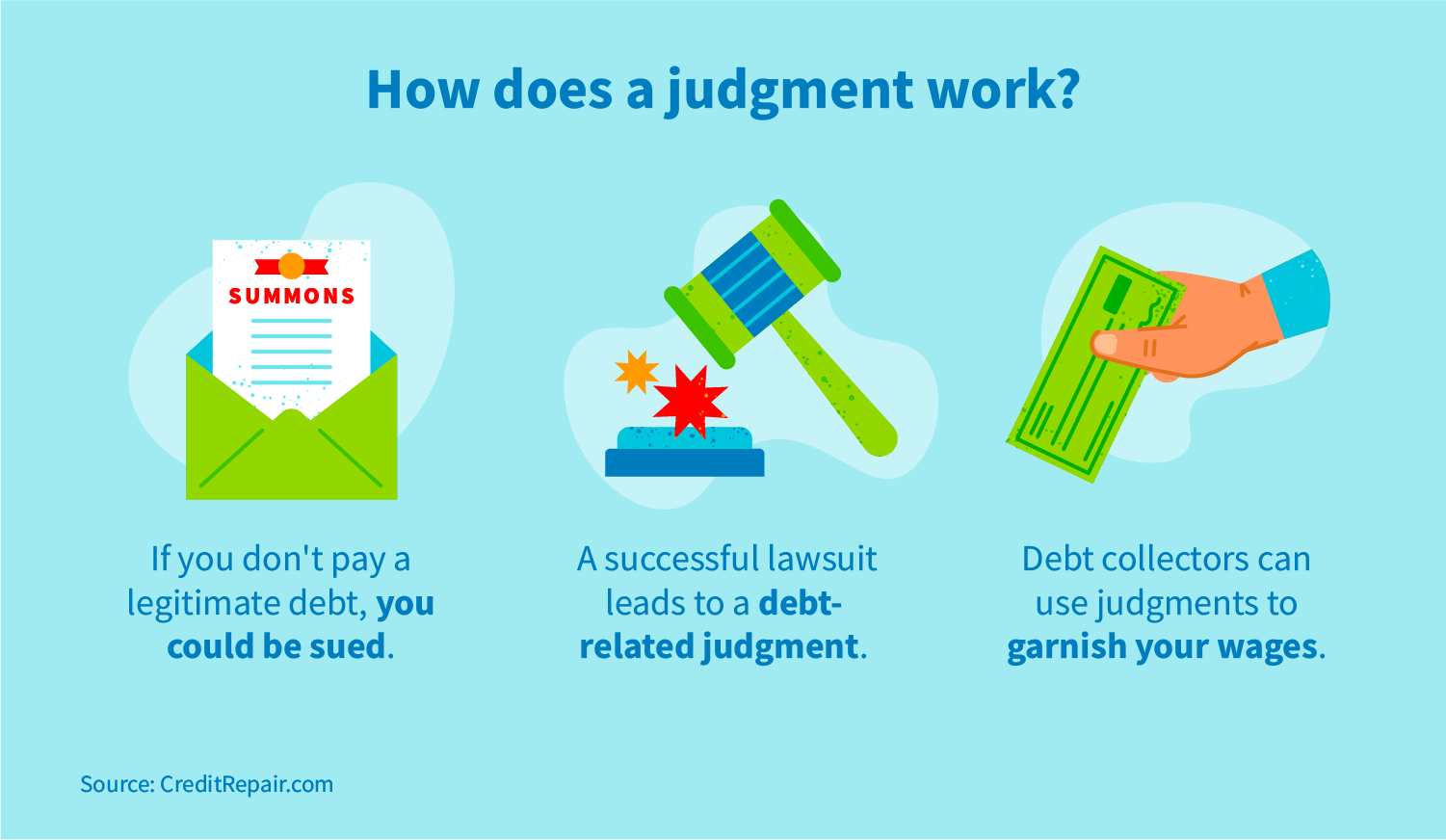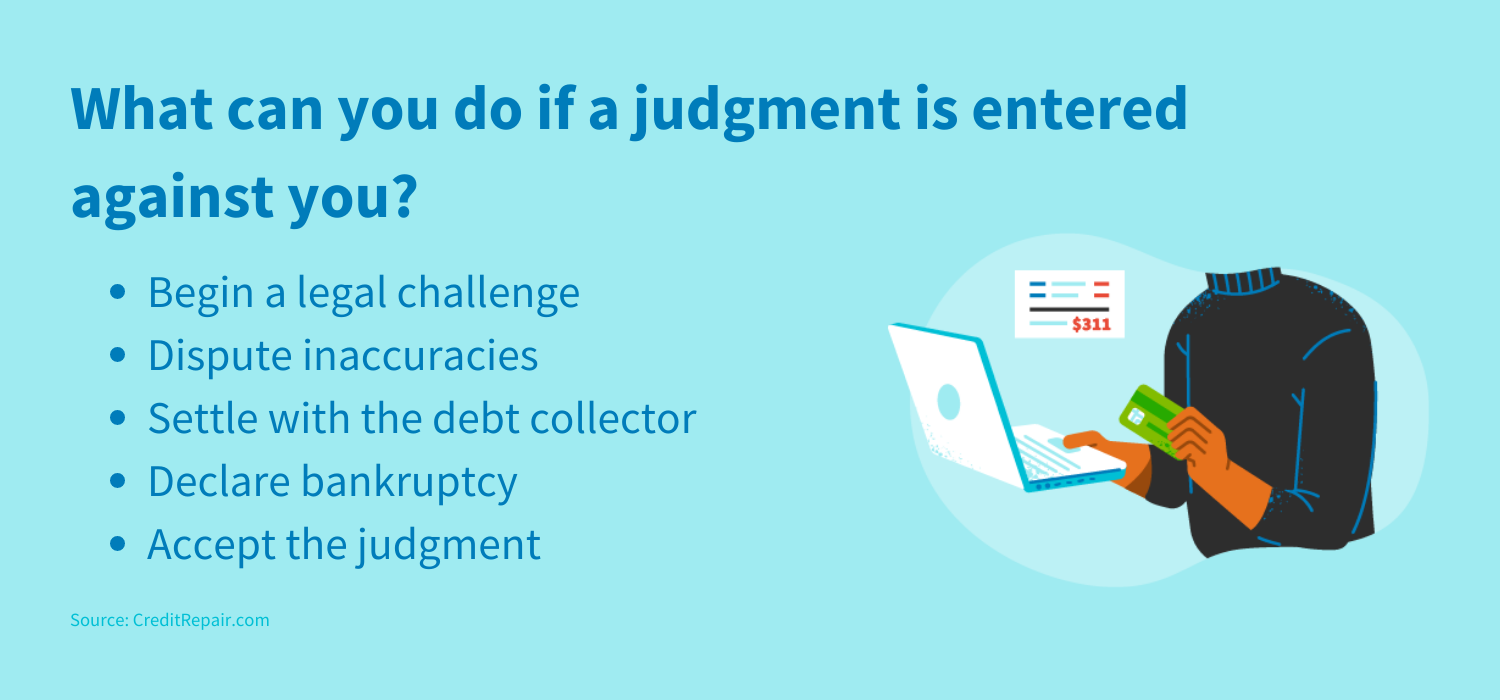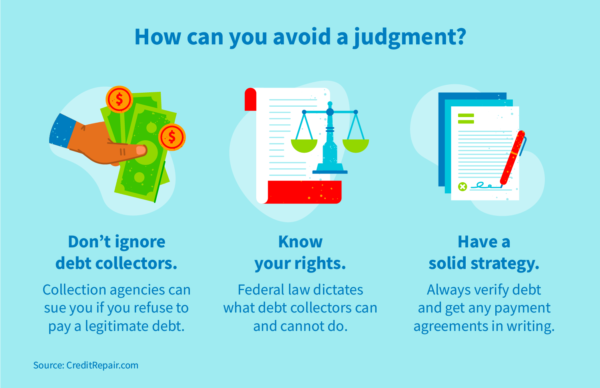
Disclosure regarding our editorial content standards.
A judgment is a legal decision issued by a court as a result of a lawsuit. If a debt collection agency successfully sues you, they can use a judgment to try to collect your debt in more forceful ways—like wage garnishment or liens on your property. While judgments rarely end up on your credit report, they are still part of the public record and may make it harder to open lines of credit in the future.
Judgments can be hard to handle, as they usually add challenges to already difficult situations. If you’re already struggling financially, facing a judgment could mean that debt collectors have access to money and property that you need.
Fortunately, there are steps you can take in response to a judgment. Read on to learn more about how judgments work, what to do if a judgment is entered against you and how to avoid judgments.
How does a judgment work?
If you fail to pay a debt you legitimately owe, a collection agency may file a lawsuit against you. If you don’t respond to the court summons or the collection agency wins the case, you could have a judgment entered against you.

The collection agency can use the judgment to try to collect money that you owe them. In most cases, the debt collector will use one or more of the following methods, which will be ordered by the court:
- Wage garnishment: Your employer will send a percentage of your paycheck to the collection agency until you have paid off the debt. That said, there are limits to how much the debt collector can take—usually around 25 percent, though it varies by state.
- Nonwage garnishment: If you don’t have current income, the debt collector may be allowed access to your bank account to collect money for the unpaid debt. However, some funds—like Social Security or disability—can’t be taken by collection agencies.
- Property liens and levies: Your property—like a car or a house—may be subject to a lien, which means that any proceeds from its sale must go toward paying your debt. In some cases, your property could be levied—seized by law enforcement to be sold in order to pay your debt.
The specifics of a judgment will vary based on the type of debt, the judge’s ruling and state laws. In any case, a judgment is a legal order, which means you’ll need to take action immediately if a judgment is entered against you.
How long do judgments stay on your credit report?
Previously, judgments could stay on your credit report for up to seven years. However, thanks to an agreement known as the 2017 National Consumer Assistance Plan (NCAP), the three major credit reporting agencies (Experian®, Equifax® and TransUnion®) no longer report judgments on credit reports. Still, this doesn’t mean a judgment on your credit report can’t impact your credit, especially your ability to acquire new credit.
What can you do if a judgment is entered against you?
If a court rules in favor of the collection agency, a judgment will be entered against you. Because a collection agency can start to use the judgment to collect money right away, you’ll want to decide quickly how to react to the court’s ruling.
You have a few options when a judgment is entered against you.

1. Begin a legal challenge
A judgment is an official legal ruling against you. If you believe the ruling is incorrect—because either the debt isn’t yours or the lender violated the law—you can take legal action. Consider hiring a lawyer and fighting the judgment to prove it’s unfair.
2. Dispute inaccuracies
If a judgment is based on inaccurate, incomplete or false information, it can be removed from your credit report. This is because every consumer has the right to an accurate credit report.
The court will pass along all the information it has about the judgment to the credit reporting agencies. If you notice any inaccuracies, you can start a dispute and remove the judgment.
3. Settle with the debt collector
If the judgment is accurate, consider reaching out to the holding debt collector to settle the outstanding amount. In some states, paying off the debt means the judgment has to legally be removed from your credit report.
Note that there’s room for negotiation here too. Some lenders will be willing to negotiate a lower amount and close out the account if you make a lump sum payment. If you get a debt collector to agree to these terms, make sure you have everything in writing.
4. Declare bankruptcy
Filing for bankruptcy can pause most judgments and stop creditors from taking action against you, such as freezing an account or garnishing your wages. However, there are some exceptions (such as child support), so make sure you understand whether your judgment will be paused due to bankruptcy. Additionally, be aware of all the other downsides that come with filing bankruptcy.
5. Accept the judgment
In some situations, you’ll find that the judgment is accurate and there isn’t much you can do to fight it. As a result, it’s best to accept the judgment. You’ll have to continue to pay the debt—often through forced liens or wage garnishment—until the account is settled.
As difficult as a judgment may be, it is possible to recover financially from a judgment. Depending on your state laws, the judgment may eventually be removed from the public record, and you can also take steps to fix your credit moving forward.
What are the different types of judgments?
There are four main types of judgments.
1. Unsatisfied
When a judgment is taken out against you, it’s considered unsatisfied until it’s paid off and settled.
2. Satisfied
A satisfied judgment is where the debt has been paid and the account has been settled. To be clear, you don’t have to pay the debt in full for a judgment to be “satisfied.” If you and the debt collector agreed to a new amount and payment term, fulfilling the new contract is enough for a satisfied judgment classification.
3. Vacated
If you appeal a judgment and it’s successfully overturned, it’s dismissed and becomes known as “vacated.”
4. Renewed
In some states, a debt collector can renew a judgment if it’s not satisfied. In fact, some states allow debt collectors to renew an unlimited amount of times—until the lender no longer wants to pursue the matter.
How can I take care of my judgment?
In many cases, it can be unclear who to pay to satisfy your judgment. You should have documents from the court detailing who you have to pay, when and how much. If you don’t have these papers, consider reaching out to the lender that took the judgment out against you for more information.
What should I do if a creditor sues me?
When a creditor sues you, you’ll receive a court summons. Many people choose not to show up to court, but this is a mistake. By not showing up, you can’t defend yourself, and the judge typically automatically approves the judgment against you. As a result, you might even find out later that your wages are garnished or you now have a lien on your property.
When you get the court summons, make sure you go so you can defend yourself.
How can I take a judgment off my credit report?
As mentioned above, if your judgment has inaccuracies on it, you can file a dispute to have it removed from your credit report. Filing a dispute can be a lengthy and challenging process, and if you’re unsure how to proceed, you might want to consider getting help. The professionals at CreditRepair.com can help file disputes on your behalf, handling every step in the process so you don’t have to.
How can you avoid a judgment?
Dealing with a judgment can be very difficult, so the best course of action is to avoid a judgment altogether if possible. Any time you have an unpaid debt, you are at risk of a lawsuit from a collection agency.

In order to avoid a lawsuit and a potential judgment, keep the following in mind:
- Don’t ignore debt collectors. Although an unpaid debt can be an enormous source of stress, it’s important that you don’t simply leave their requests unanswered, or you may end up with a lawsuit.
- Know your rights. Be aware of what debt collectors can and cannot do so that you can protect yourself when dealing with a collection agency.
- Have a solid strategy. Make sure you have a good plan for dealing with debt collectors: verify the debt, get everything in writing and negotiate or settle the debt.
By working with debt collectors to establish a payment plan or negotiate a smaller lump sum, you can pay off your debt, potentially get negative items removed from your credit report and avoid lawsuits and judgments.
If a collection agency is demanding payment for a debt you don’t actually owe, you may have an inaccurate negative item on your credit report. This negative item may bring down your score, and you could be making payments on an illegitimate debt. In this case, you’ll want to make an effort to repair your credit and ensure the information on your report is fair and accurate.
Note: The information provided on CreditRepair.com does not, and is not intended to, act as legal, financial or credit advice; instead, it is for general informational purposes only.
Questions about credit repair?
Chat with an expert: 1-800-255-0263






